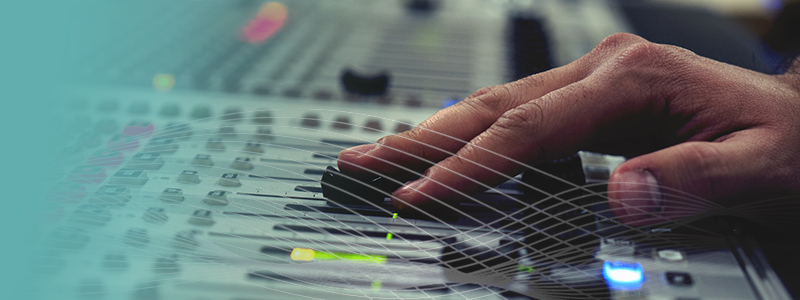
Audio Engineering for Beginners
If a tree falls in the forest and nobody is around to hear it, did it make a sound? If you asked an audio engineer that question, he’d probably say – sure. If the forest had a pair of 8-ohm, 1000-watt speakers with a couple of 8-ohm 1500-watt power amps, then he’d probably start talking about adding some reverb to the sound the tree makes for effect.
Yes, if you thought the engineering world was totally nerdy, the audio engineer could be described as the cool kid on the block. After all, there’s something pretty cool about manipulating sound. And ultimately for many audio engineers – creating music. If you’ve always been interested in all-things-audio, stick around while we break down some of the basics of audio engineering for beginners.
What is audio engineering?
– Audio engineering is the process of manipulating and reproducing sound. Whether it’s the audio for a music video, a sports broadcast, or Jay-Z laying down a fresh track in the recording studio, the sound has been engineered in some way. There are differences between engineering live sound and studio sound, but the basics of audio engineering include the following tools.
Mixing Console
– Just like your brain routes signals to the rest of your body, the mixing console does something similar. Everything in your audio bag of tricks is controlled and routed through here. Think of it as an electronic funnel that processes multiple signals down into one path. And each signal is a different channel. The channels can be individually adjusted and then mixed together to create a unique sound.
Equalizers
– An equalizer is used to correct or adjust individual frequencies. It’s also used to eliminate or soften certain sounds. It all happens by tweaking a particular frequency up or down to boost or weaken the audio signal. An example would be when you adjust the treble or bass to change the balance of sound coming from your stereo.
Speakers
– There are two different types of speakers – active and passive. The main difference between the two is in the amplifier. An active speaker has a built-in amplifier and a passive speaker requires an external amp which is connected with speaker wire. Passive speakers are more often in the home, while active speakers are typically used in professional recording studios. Some audio engineers prefer active speakers because you can tweak your system based on the amplifier you choose. With passive speakers, you get what you get, which is not always a bad thing. But it does leave you with less options.
Amplifiers
– It’s important to understand how the electrical components of audio engineering work together. Especially when it comes to amplifiers and speakers. It starts with the word – impedance. Impedance is a component’s measure of electrical resistance and is measured in ohms. You may have seen the upside-down horseshoe-looking symbol that represents an ohm – Ω. The most important thing to know about impedance, is that your speakers and amplifier must have a compatible ohm rating. A good rule of thumb is to select an amplifier 50% more powerful than your speakers. And never select one that has a lower ohm rating.
Mixing and Mastering
– putting it all together – There’s more than just equipment to learn about in audio engineering. The true magic happens in two parts of the process. Mixing and Mastering. Mixing is the process of blending the sound of individual instruments, voices and tracks into a “mix” that works. The mixing stage is like building an audio jigsaw puzzle, piece by piece. Equalizing and other effects are added to get to the final product before the “mix” is complete.
The mastering part is the fine-tuning – of the fine-tuning of that puzzle. It’s taking the mix and making a final version that works in any system – radio, tv, phone etc. The level of effort during the mastering process depends on many things and can be minor or quite elaborate. But both mixing and mastering are essential parts of audio engineering.
Audio engineering careers are definitely on the rise. The Bureau of Labor Statistics predicts the industry will continue to grow by as much as 8% by 2026. If you’d like to learn more about a career in audio engineering, check out the programs at International College of Broadcasting (ICB). With an associate degree program that combines both Video Production and Audio Engineering, ICB is helping students get the hands-on training and skills they need to launch successful careers in this exciting industry. Contact us now for more information or to schedule a campus tour.

